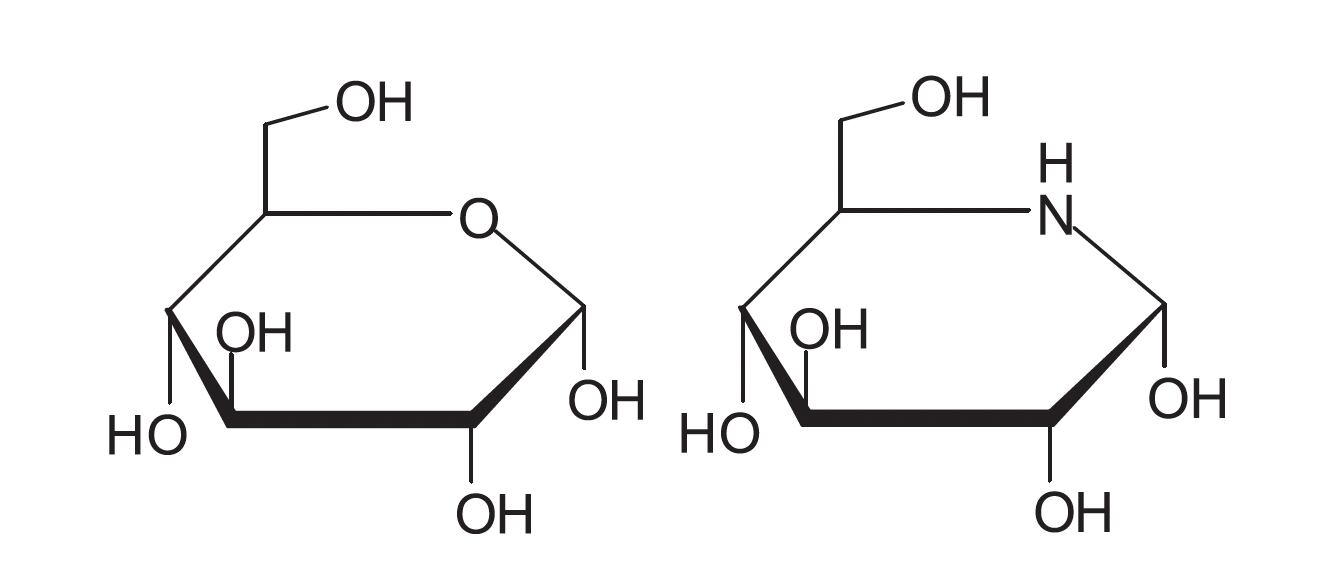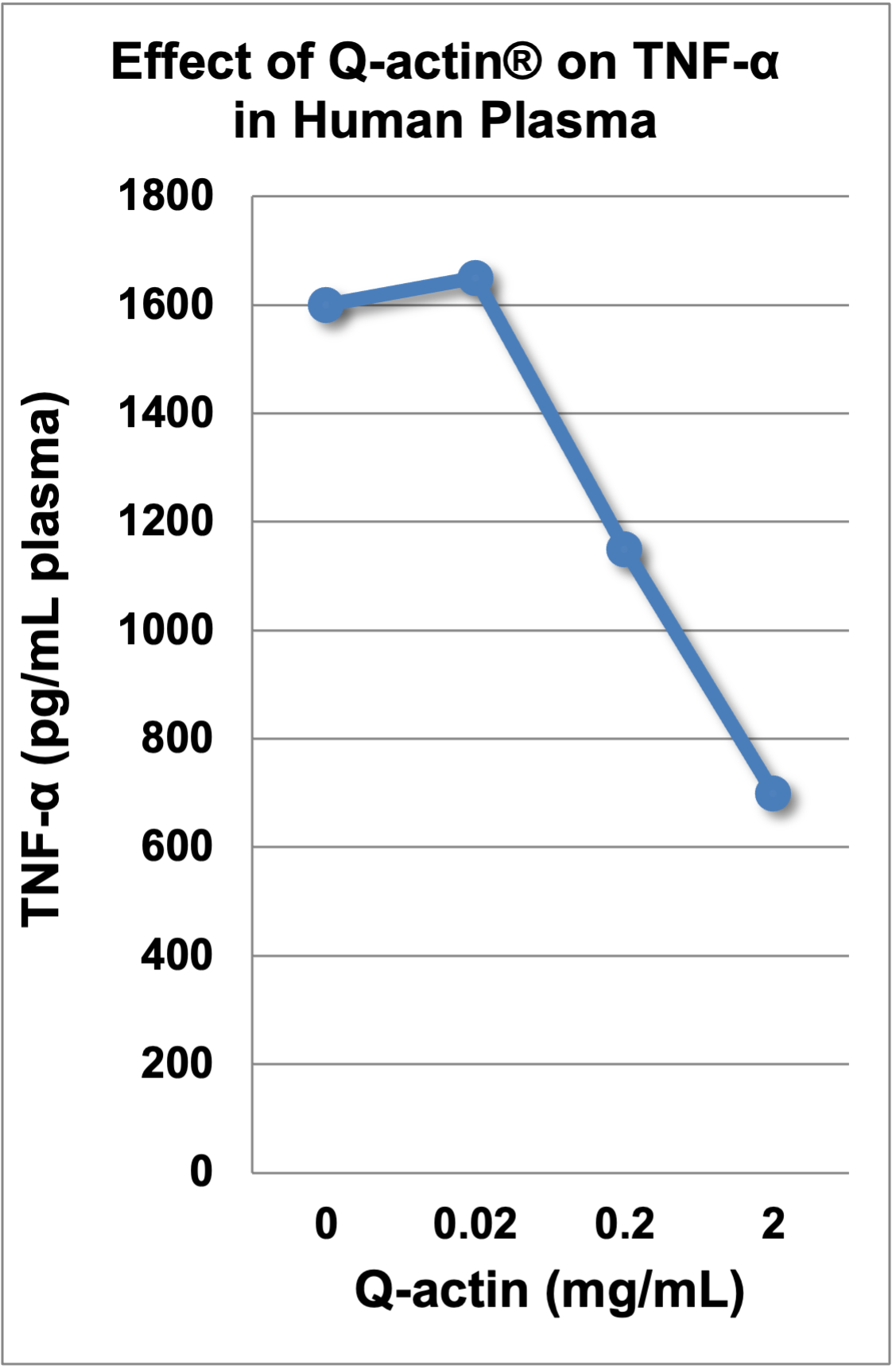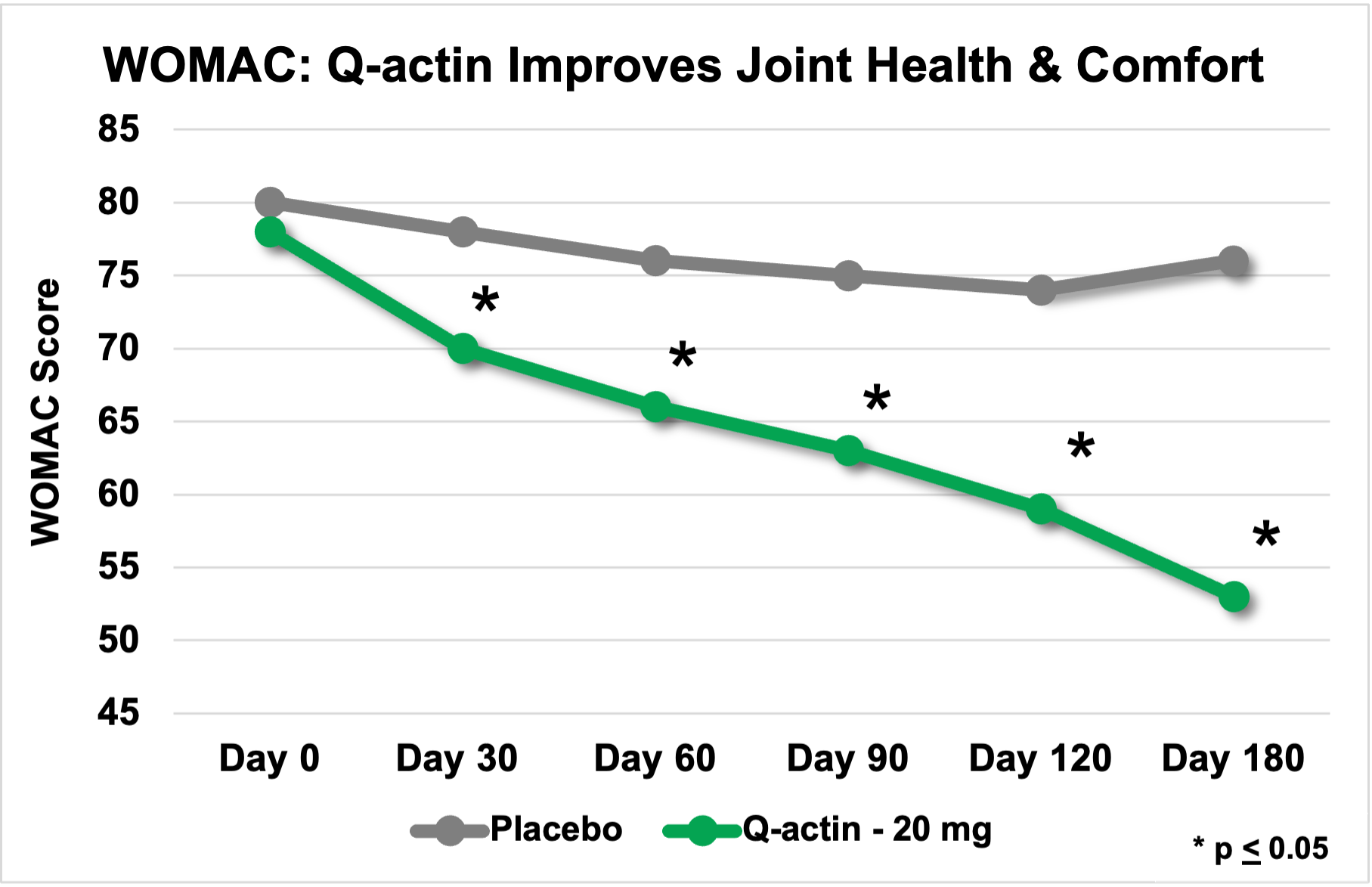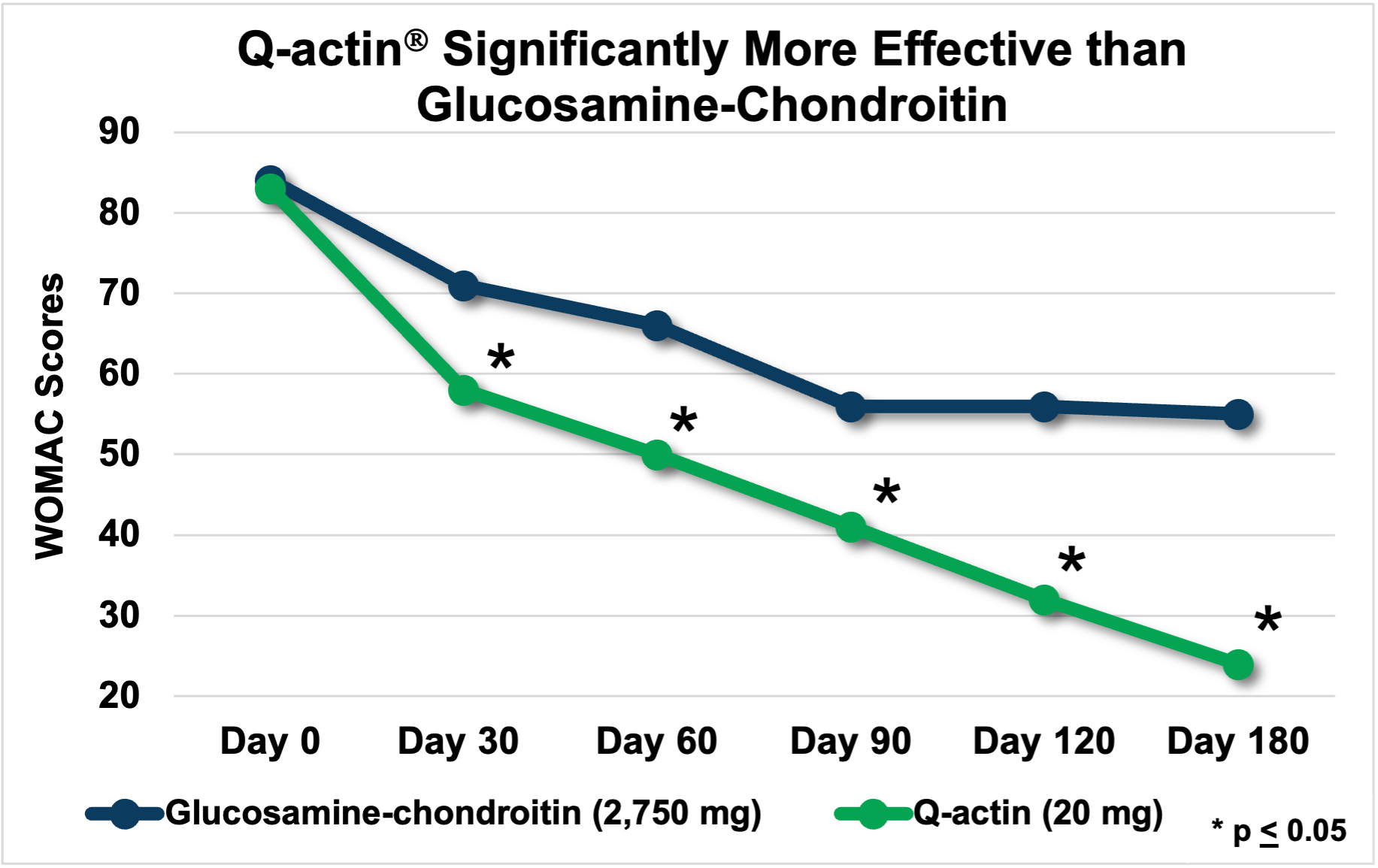Mobility, comfort and restorative sleep are the cornerstones of vitality and long-term health.
Yet millions experience a gradual loss of these freedoms as inflammation, stiffness and poor sleep take hold – not just with age, but through modern lifestyles, stress and repetitive activity. New scientific insights are revealing iminosugars as a novel class of bioactive carbohydrates that help restore balance where inflammation begins.
At the forefront is Q-actin™, a patented cucumber extract standardized to the iminosugar ido-BR1, delivering clinically proven benefits for joint comfort, mobility and sleep with an extraordinarily low dose of just 20mg per day.
To date, more than 200 naturally occurring iminosugars have been identified in plants, forming one of the most structurally diverse families of bioactive carbohydrates known. Their unique nitrogen-containing ring structure enables these sugar-like molecules to interact with a broad range of enzymes and receptors involved in glycan metabolism and cell signaling – pathways that influence inflammation, immunity and metabolic balance. Several iminosugars have been approved as pharmaceuticals in Europe and Asia, underscoring their potent biological activity and excellent safety profile.

These same characteristics make iminosugars a new frontier for nutrition and functional-ingredient innovation, offering plant-derived, low-dose compounds that can precisely modulate key physiological processes to support everyday health and wellness. For nutrition and supplement developers, they offer a precise way to influence the body’s own balancing mechanisms and deliver measurable benefits in remarkably small doses.
Iminosugars represent an emerging field of nutritional science with tremendous potential – and Q-actin is the first ingredient to demonstrate their proven benefits in a supplement application.
Nature and innovation converge
The development of Q-actin began with research into the traditional uses of cucumber for cooling and soothing. Scientists identified that certain specific cucumber varieties contained a highly active iminosugar, ido-BR1, responsible for much of the plant’s anti-inflammatory potential.
Through advanced extraction and standardisation, IminoTech transformed this discovery into a patented ingredient standardised to more than 1% ido-BR1. Unlike common cucumbers, which have negligible levels of the compound, the varieties used for Q-actin are cultivated specifically for their iminosugar content. This ensures the consistency, potency and purity essential for functional ingredients.

Multi-targeted mechanisms for mobility and recovery
Mobility and recovery depend on the smooth interplay of cartilage, connective tissue and muscle. Inflammation disrupts that harmony by damaging cartilage and triggering discomfort. Q-actin addresses these issues through complementary mechanisms of action that calm inflammatory pathways while supporting structural integrity:

- Reducing TNF-α This cytokine triggers the breakdown of cartilage by activating enzymes called metalloproteinases. Q-actin suppresses TNF-α, helping protect joint tissue.¹
- Inhibiting α-L-iduronidase and sialidases These enzymes degrade glycosaminoglycans (GAGs), essential components of cartilage and tendons. Q-actin’s inhibition of these enzymes preserves connective-tissue integrity.¹
- Regulating hyaluronic-acid activity During inflammation, excess hyaluronic acid can paradoxically become pro-inflammatory by binding to CD44 receptors on immune cells. Q-actin normalises this process, promoting lubrication without irritation.¹
Together, these mechanisms help maintain joint lubrication, protect cartilage and ease stiffness. This multitiered activity distinguishes Q-actin from single-pathway actives. It doesn’t simply mask pain, it helps rebalance the body’s natural inflammatory responses, supporting lasting mobility and comfort.
Clinical research: Consistent results across three human trials
The science supporting Q-actin spans three independent human clinical trials, including two randomised, placebo-controlled trials and one comparative study against glucosamine-chondroitin. Across these studies, participants taking Q-actin consistently reported significant improvements in measures of joint comfort, flexibility and physical function at the same low 20mg dose.
Joint relief for a broad population
In the most recent double-blind study, 80 adults with mild to moderate joint discomfort – not limited to osteoarthritis – consumed 20mg/day of Q-actin or placebo for 60 days.² Assessments using the Western Ontario and McMaster Universities Osteoarthritis Index (WOMAC), Lequesne Functional Index (LFI), Brief Pain Inventory (BPI) and Pain Disability Index (PDI) were conducted at days 15, 30 and 60.
Significant improvements appeared by day 30 and strengthened through day 60, including:
- Western Ontario and McMaster Universities Osteoarthritis Index (WOMAC) measures joint function.
- Visual Analogue Scale (VAS) measures pain reduction.
- Lequesne's Functional Index (LFI) measures joint function and the ability to perform daily activities.
- 31.8% decrease in WOMAC scores, reflecting less pain, stiffness and better function.
- 32.4% reduction on the Pain Disability Index, indicating less interference with work, sleep and mood.
- 10% improvement in LFI, showing measurable gains in mobility and functional capacity.
These findings confirm that Q-actin delivers perceptible benefits within two months for adults with mild to moderate joint pain, making it highly suitable for mainstream joint-comfort formulations.
Randomised, placebo-controlled osteoarthritis study
A six-month, double-blind study of 91 adults with knee osteoarthritis compared daily doses of 20mg and 100mg Q-actin with placebo.³ Following a baseline evaluation, subjects were evaluated at 30-day intervals using WOMAC, VAS and LFI scales.
- The 20mg group showed significant improvement in pain, function and mobility, with 32% to 40% gains across measures.
- The 100mg group achieved even greater improvements of 40% to 50%, confirming a dose-dependent response.

Comparative study vs glucosamine-chondroitin
In a six-month, head-to-head, randomised, double-blind trial, 122 adults with moderate knee osteoarthritis received either 10mg Q-actin twice daily or 1,350mg glucosamine-chondroitin.⁴ Q-actin produced significant improvements (p < 0.05) at every evaluation point (30 to 180 days).
- 70% improvement in WOMAC and 46% reduction in VAS pain, compared with 33% and 26% for glucosamine-chondroitin.
- 27% improvement in LFI versus 8% for glucosamine-chondroitin.

Safety and mechanistic studies
Toxicology studies confirmed Q-actin’s safety even at 2,000mg/kg in animals, with no mutagenic or genotoxic effects.⁵ In cell models, Q-actin inhibited NF-κB signaling and reduced TNF-α, IL-6 and nitric oxide, demonstrating strong anti-inflammatory potential at micro-doses.
Beyond joints: Clinical evidence for sleep and dexterity
Because inflammation and disrupted cytokine signaling are known to interfere with circadian rhythm and neuromuscular control, researchers sought to determine whether Q-actin’s anti-inflammatory and neuromodulatory effects could also influence sleep quality and motor performance.

In a 12-week, randomised, placebo-controlled trial, 47 healthy adults aged 50 to 78 consumed two Q-actin gummies (providing 20mg/day) or placebo.⁶ Results demonstrated:
Statistically meaningful improvements in subjective sleep quality (measured with the Pittsburgh Sleep Quality Index).
- Significant increases in urinary melatonin metabolites (6-sulfatoxymelatonin, 6-hydroxymelatonin), indicating enhanced natural melatonin production and support for the body’s own sleep-wake rhythm.
- Enhanced finger-dexterity scores on the Nine-Hole Peg Test, a marker linked to neuromuscular and cognitive performance.
These findings suggest that Q-actin may support biological processes connecting inflammation, sleep and fine motor function, reinforcing its role as a multi-benefit ingredient for movement, rest and recovery.
Formulation advantages for modern brands
Low effective dose At 20mg/day, Q-actin can be incorporated into virtually any delivery format without taste or texture impact. For functional beverages, its tiny serving means it fits easily into small-volume shots or stick packs.
Plant-based and clean-label Derived from a specific cucumber species (Cucumis sativus L.), Q-actin resonates with consumer demand for natural, traceable ingredients.
Multifunctional appeal Providing joint comfort, mobility and sleep/neuromuscular benefits, this one ingredient serves multiple wellness platforms – active aging, sports recovery, cognitive vitality and general wellbeing.
Strong safety and quality Supported by comprehensive toxicity data and a decade of market use with no serious adverse events.
The future of iminosugars
Q-actin represents the first in a growing family of iminosugar-based ingredients being explored for applications in immune, metabolic and cognitive health. These molecules offer a precision-driven approach to wellness that modulates multiple pathways gently and effectively.
For formulators and brand owners, this opens a new chapter in low-dose functional design: natural compounds with high potency, strong stability and flexible delivery potential. As interest grows in smaller, smarter, multi-benefit ingredients, iminosugars stand poised to redefine what ‘functional’ can mean in both supplement and beverage innovation.
Small dose, big promise
The hallmark of Q-actin is efficiency. With clinical validation across joint, mobility and sleep endpoints, and with an effective daily serving of only 20mg, it meets the market’s demand for compact, evidence-based solutions that deliver noticeable benefits.
As consumers continue to prioritise movement, rest and daily resilience, Q-actin gives manufacturers a scientifically grounded, naturally derived ingredient that meets these needs in one clean-label, low-dose formulation.
References
- Nash, R.; et al. Iminosugar idoBR1 Isolated from Cucumber Cucumis sativus Reduces Inflammatory Activity. ACS Omega. 2020; 5(26), 16263-16271.
- Hausenblas, H.; et al. Efficacy of a Cucumber Extract (Q-actin™) in Adults with Mild–Moderate Joint Pain: A Randomized, Double-Blind, Placebo-Controlled Trial. Cureus. 2025; 29;17(9):e93507.
- Nash, R.; et al. Standardised ido-BR1 Cucumber Extract Improved Parameters Linked to Moderate Osteoarthritis in a Placebo-controlled Study. Current Rheumatology Reviews. 2023; 19: 345-351.
- Nash, R.; et al. Effectiveness of Cucumis sativus Extract Versus Glucosamine-Chondroitin in the Management of Moderate Osteoarthritis: a Randomized Controlled Trial. Clinical Interventions in Aging. 2018; 13: 2119–2126.
- Kothari, S.; et al. Safety Assessment of a Standardized Cucumber Extract (Q-Actin™): Oral Repeat-dose Toxicity and Mutagenicity Studies. Toxicology Reports. 2018; 1078-1086.
- Lloyd, A.; et al. Oral Supplement in Healthy Older Adults to Support Physical Fitness and Mental Wellbeing. Frontiers in Nutrition. 2025; 12.


